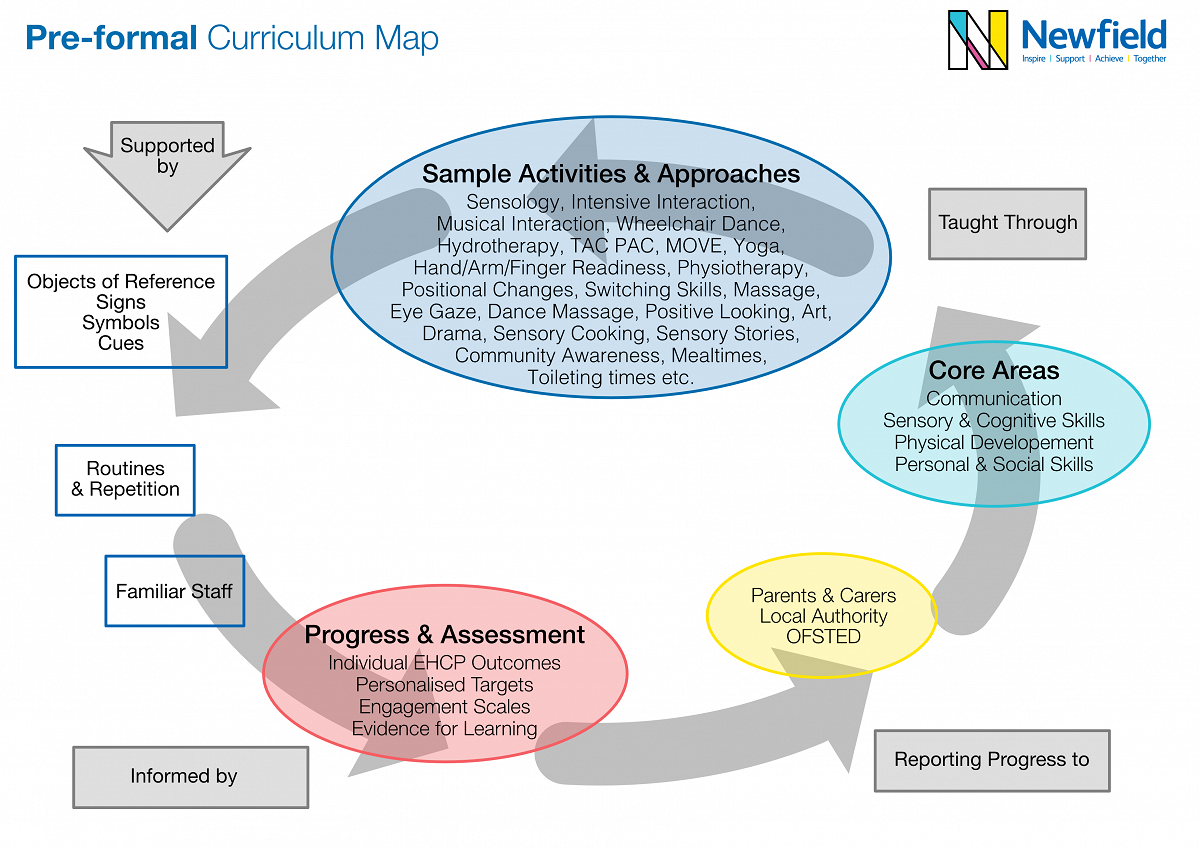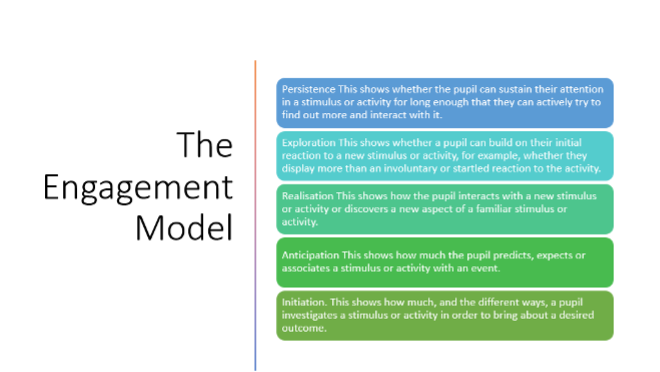Pre-Formal
Our pre-formal pathway takes a holistic view of learners by focusing on how they best learn through acknowledging and celebrating the different abilities and achievements of those learners with the most complex needs.
Our pre-formal curriculum is designed to provide a stimulating education for learners who have: ‘Profound and multiple learning difficulties as well as complex learning needs. In addition to very severe learning difficulties, pupils have other significant difficulties, such as physical disabilities, sensory impairment or a severe medical condition. Pupils require a high level of adult support, both for their learning needs and also for their personal care. They are likely to need sensory stimulation and a curriculum broken down into very small steps. Some pupils communicate by gesture (including body language, facial expression), eye pointing or symbols, others by very simple language.’ The Salt Review 2010.
Learners not yet engaged in subject specific learning engage with the pre-formal curriculum. This focuses on the early communication, physical, personal & social and sensory & cognitive skills that are the foundation of learning.
For learners who make progress from this pathway but who are not yet ready for a Semi-Formal pathway we have developed a ‘Pathfinder’ layer. This is for learners who are making the initial steps towards subject specific learning and are likely to remain at this stage for some time.
The curriculum is delivered via termly themes constructed around the Areas of Learning and designed to provide opportunities for learners to make connections within their learning experience e.g. between resources or vocabulary.
The themes for the Pre-Formal Pathway can be found here:
The Schemes of Work that sit alongside the theme map can be found in each section below.
Pre-formal
Pupils at very early levels of development who may have profound or complex learning difficulties access a pre-formal curriculum which provides engaging opportunities and promotes and enables early skill development focusing upon functionality of movement, communication and purposeful interactions within their environment (also known as non-subject specific learning). Within school pupils will be working within Engagement Steps (B Squared).
The Areas of Learning covered in the Pre-Formal curriculum are:

At the Pre-Formal pathway learners experience learning through all aspects of their sensory processing and early communication skills are developed throughout all activities.

Our Pre-Formal Curriculum Philosophy can be found here.
An example Pre-Formal Weekly Class Timetable can be found here (red indicates individual therapies/interventions).
Cognition and Learning
At Newfield we want our learners to be:
Empowered and challenged to reach their full potential
Confident and committed to lifelong learning
Children at the very early stages of development need facilitation to explore and interpret the world around them. They have difficulty in making sense of that world and need many opportunities to handle and test out objects, look for patterns and sequences in experiences and generally extend their focus from the immediate to things further away. Many children with Profound and Multiple Learning Difficulties (PMLD) have physical or sensory impairments that undermine their ability to discover things for themselves and have even more need for other people to assist them to explore and develop understanding. When developing the learners’ cognitive skills, it is paramount that they have a wide range of opportunities to improve their sensory skills. Developing their awareness and ability to respond to different stimuli that they receive through sight, hearing, touch, taste, balance and movement (vestibular sense) or muscle and joint sense (proprioceptive sense) we enhance their further understanding and experience of the world.
The thematic approaches to developing learner’s skills help them to engage with activities while building their ability to anticipate, initiate, persist with, realise and explore the world around them.
As learners move into Pathfinders their learning experience becomes more focused toward developing subject specific skills with more direct group teaching featuring as part of the weekly timetable. Early Mathematical Understanding also becomes part of the timetable with opportunities to embed mathematical skills through play-based activities and continuous provision.
Class teaching occurs in an enabling environment that allows learners to explore resources and provide continuous provision to support the on-going engagement of learners while developing their concentration and attention skills.
Scheme of Work - Cognition and Learning - Pre Formal Curriculum
Click here to view or downloadCommunication and Interaction
At Newfield we want our learners to be:
Effective communicators
Happy, engaged and included members of their community
All classes at Newfield support a Total Communication environment where all communication attempts by a learner are valued, recognised and supported. Total Communication encourages the use of all forms of communication alongside the spoken word, such as gestures, vocalisations, sensory cues, objects of reference, photos, Makaton signing and symbols. This approach supports a child or young person’s ability to understand and communicate with those around them.
Pupils with PMLD are often at a stage before their communication becomes fully intentional. Staff need to be skilled and sensitive in interpreting behaviour so we can respond appropriately. We need to respond as if the children are intentionally communicating to teach them how to become intentional communicators and Intensive Interaction is used to encourage and develop this. Some learners will be more intentional in their communication but not yet able to use conventional language. At this level, learners will be developing ways of indicating what they like and dislike. Gestures might be used to request objects or just to ‘comment’ on something that can be seen. A responsive environment provided by staff should include a widening range of motivating activities upon which children can ‘comment’.
Pathfinders are developing more fully intentional communication and often require augmentation to their communication methods (e.g. PECS, Makaton) to enable them to communicate in a more functional or social way.
Communication is a fundamental part of all we do at Newfield and every learning activity and aspect of the school day includes opportunities for communication and interaction.
Scheme of Work - Communication - Pre Formal Curriculum
Click here to view or downloadPhysical and Sensory Development
At Newfield we want our learners to be:
Healthy in body and mind
As independent as possible
For pupils working at the earliest levels, the immediate priorities are to develop body awareness and physical control and to establish which positions are most physically comfortable for them. It is vitally important that children with PMLD have opportunities to learn to move around, both supported and freely in order to explore their world. School staff work closely with Physiotherapists and Occupational Therapists in order to provide the best programmes for supporting learner’s physical development.
The MOVE (Movement Opportunities Via Education) is widely used at Newfield School to maximise the opportunities of all learners to move independently at least in part and at least during some periods in each day. Newfield is a MOVE accredited school and holds the Gold level of the MOVE Quality Mark. The MOVE Programme is an activity-based practice that enables disabled children and young adults to gain independent movement. It uses the combined approach of education, therapy and family knowledge to teach the skills of sitting, standing, walking and transitioning between.
Many of our Pathfinders are independently mobile but have a range of sensory needs which mean they may struggle to process sensory information from the world around them and organise it in a meaningful way which helps them access learning. Sensory lifestyles incorporate an acknowledgement of this need, and access to resources and activities to meet sensory needs, into the daily routine of learners.
Scheme of Work - Physical and Sensory Development - Pre Formal Curriculum
Click here to view or downloadIndependence and Community
At Newfield we want our learners to be:
Happy, engaged and included members of their community
Healthy in mind and body
Learners develop their personal, social and emotional skills in this Area of Learning as well as focusing on being as independent as possible in all they do and achieve.
We never do for a student something they can, could or should do for themselves.
Learners have opportunity to develop an increasing awareness of themselves and their impact on the world around them through working on aspects such as turn-taking, social communication, the environment, emotional regulation and expressing preferences and choices. Staff work to provide opportunities where friendships and peer activities are embedded into the learning experiences offered throughout the week.
Learning takes place in contexts which enable learners to generalise and broaden any skills they develop and these contexts may include Outdoor Learning, community-based learning, other settings around school
Scheme of Work - Independence and Community Development - Pre Formal Curriculum
Click here to view or downloadAssessment
Pre-Formal
For learners on the pre-formal pathway assessment is a continuous process. Routes for Learning assessment and individual EHCP outcomes are formulated learning intentions for each learner and staff make on-going observations to capture and monitor progress.

On order to capture progress staff regularly evaluate the progress each learner is making towards their targets and uses this information to inform the next steps of progress.
The Evidence for Learning app helps us to track and capture evidence of the success each learner has and allows us to share this with their parents in an accessible and engaging format.
